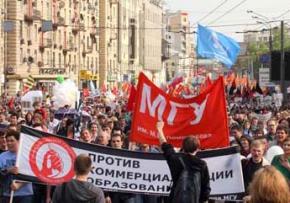A wave of repression in Russia
On May 6, the eve of Vladimir Putin's inauguration for yet another term as Russia's president, tens of thousands of people gathered in Moscow to protest the fraudulent election that Putin won in March and to demand democracy. Police beat protesters and arrested 400 people, including the leader of the Left Front, Sergei Udaltsov. In a continuation of the repression, pro-democracy activists were arrested this month in connection with the demonstration.
The was founded in March 2011, amid previous rigged elections, by two organizations, the Socialist Movement Vperiod ("Forward"), the Russian section of the Fourth International, and Socialist Resistance. In this statement, the organization describes the stakes in the fight for democracy in Russia.
IN RUSSIA, the first half of October was marked by a tightening of repression against the opposition. As of right now, 19 people have been accused in for their part in so-called "massive disturbances of public order" on May 6. Most of them are, at present, in jail.
While arbitrary arrests of participants because of the spring actions continue, it is already clear that a massive political trial against leaders of the opposition is being prepared. On October 5, one of the main Russian television channels, NTV, broadcast a film, produced in the style of an "investigative documentary, which contained unprecedented accusations against the opposition, especially the best-known figure of the left opposition, Sergei Udaltsov.
In this propaganda film--in the tradition of Nazi propagandist Joseph Goebbels--Udaltsov is alleged to have maintained links with foreign intelligence services. The main activity of the Left Front, which Udaltsov heads, is supposedly to have schemed with external enemies of the country.

As evidence, the film reproduced the recording of a conversation between Udaltsov, Left Front activist Leonid Razvojaev, Russian Socialist Movement member Konstantin Lebedev and one of the closest advisers of the president of Georgia, Guivi Targamadze. The conversation suggests a transfer of money from Georgia in order to "destabilize" Russia.
Although the faces are barely visible on the recording and the sound has been recorded and added onto the video separately, barely two days later, it was used as a pretext for a criminal action brought by the Investigating Committee of the Prosecutor's Office of the Federation--the body that is today taking the leading role in organizing the repression.
On October 17, our comrade Konstantin Lebedev was arrested, and Sergei Udaltsov was released after interrogation, subject to signing an agreement not to leave the territory of Moscow. As for the third participant in the "case," Leonid Razvojaev, he applied for political asylum in Ukraine, but was kidnapped in the center of Kiev by employees of the Russian secret services.
It should be noted that the Prosecutor's Office, although acting under the guise of a spy conspiracy, finally has accused the three individuals of "massive public order disturbances." The aim is to launch a potentially major trial, in which several cases will be treated together and the activity of the pro-democracy movement's challenge to the regime will appear as a giant conspiracy.
It is important to note also that both the accused in the case of "espionage" and the majority of those arrested for their participation in "public order disturbances" on May 6 belong to different fractions of the left. On the eve of the implementation of new austerity measures in Russia, attacks against workers' rights and the pension reform, what frightens the Putin-Dmitri Medvedev duo is the possibility of seeing the democratic movement that already exists unite with elements of social protest.
The wave of repression that we are witnessing today is a stress test for the protest movement: Either we will hold firm, or we will have to go through a new period of apathy and fear.
Facing this unprecedented police pressure, we need the solidarity of our comrades in Europe and around the world. We ask for the organization of pickets for the immediate release of Konstantin Lebedev, the stopping of the criminal action against Sergei Udaltsov and Leonid Razvojaev, and the release of political prisoners who took part in the protest on May 6 in Moscow.
First published at International Viewpoint.


